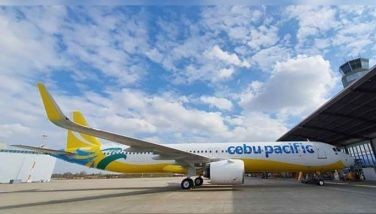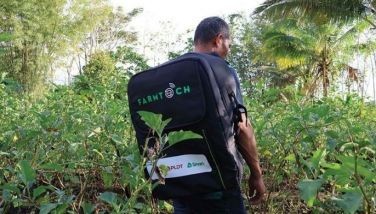Growth in Asia Pacific region seen to pick up in 2002-2003
June 8, 2002 | 12:00am
Asia Pacific economies will see accelerated growth in 2002 and face less uncertainty than in the previous six months, but their growth will still be below levels before the onset of the Asian economic crisis in 1997.
This is the assessment of the Pacific Economic Cooperation Council in its recently released Pacific Economic Outlook, according to Roberto R. Romulo, chairman of the Philippine PECC national committee.
The weighted average output of the region rose 1.2 percent last year and the rate is expected to accelerate to 2.7 percent in 2002 and 3.8 percent in 2003, still below the range of recent experience, according to the council, which promotes economic cooperation in the Pacific Rim.
Among East Asian economies, the Philippines and Indonesia grew fastest at 3.4 percent and 3.3 percent, respectively in 2001. Growth in the Philippine economy can be explained by stable consumption demand boosted by the improved performance of agriculture and the continued resilience of services.
The Philippine economy is estimated to grow by 3.4 percent to four percent in 2002. This estimate is, however, closely tied to the crucial assumption that the United States will recover in the middle of 2002.
Performance within the region is also much more differentiated than in the past. The swings in performance are more dramatic than in the 1990s before the financial crisis. At the same time, there is less uncertainty about the direction of change of the key elements of the short-term outlook compared to say six months ago.
PEO coordinator Prof. Ross Garnaut of the Australian National University identified the key risks in the forecast as those related to the changes in foreign exchange markets, driven by reassessments of the value of holding US dollar assets.
There are also risks in energy markets, and an important issue in some economies in the strength of the likely El Niño effect. In the medium term, progress on global trade liberalization is a crucial determinant of growth in the PEO economies.
On the local front, Philippine PEO forecaster Dr. Cayetano W. Paderanga identified some pending economic risks that need to be addressed if growth is to be sustained – the conflict in Mindanao and other security isues, the final resolution to the pending Estrada case, pervasive rumors of coup attempts, and the weakness in the banking system, as evidenced by the large amount of non-performing loans.
To ensure recovery in 2002, the finance and corporate sectors will have to shape up, particularly by reducing non-performing loans and improving corporate governance.
"During this period of slow credit expansion and net capital inflows, any sign of progress in dealing with non-performing loans would increase confidence in the financial sector and in the economy," Paderanga said.
The council brings together government officials, academics and business people to share perspectives and expertise in search of broad-based answers to regional economic problems. Founded in 1980, it is the only private observer body in the ministerial forum, APEC.
The Philippine PECC is chaired by presidential adviser on international competitiveness Roberto R. Romulo with Rizalino S. Navarro, Andres Soriano III and Jesus P. Estanislao as vice chairman for government, business and the academe, respectively.
This is the assessment of the Pacific Economic Cooperation Council in its recently released Pacific Economic Outlook, according to Roberto R. Romulo, chairman of the Philippine PECC national committee.
The weighted average output of the region rose 1.2 percent last year and the rate is expected to accelerate to 2.7 percent in 2002 and 3.8 percent in 2003, still below the range of recent experience, according to the council, which promotes economic cooperation in the Pacific Rim.
Among East Asian economies, the Philippines and Indonesia grew fastest at 3.4 percent and 3.3 percent, respectively in 2001. Growth in the Philippine economy can be explained by stable consumption demand boosted by the improved performance of agriculture and the continued resilience of services.
The Philippine economy is estimated to grow by 3.4 percent to four percent in 2002. This estimate is, however, closely tied to the crucial assumption that the United States will recover in the middle of 2002.
Performance within the region is also much more differentiated than in the past. The swings in performance are more dramatic than in the 1990s before the financial crisis. At the same time, there is less uncertainty about the direction of change of the key elements of the short-term outlook compared to say six months ago.
PEO coordinator Prof. Ross Garnaut of the Australian National University identified the key risks in the forecast as those related to the changes in foreign exchange markets, driven by reassessments of the value of holding US dollar assets.
There are also risks in energy markets, and an important issue in some economies in the strength of the likely El Niño effect. In the medium term, progress on global trade liberalization is a crucial determinant of growth in the PEO economies.
On the local front, Philippine PEO forecaster Dr. Cayetano W. Paderanga identified some pending economic risks that need to be addressed if growth is to be sustained – the conflict in Mindanao and other security isues, the final resolution to the pending Estrada case, pervasive rumors of coup attempts, and the weakness in the banking system, as evidenced by the large amount of non-performing loans.
To ensure recovery in 2002, the finance and corporate sectors will have to shape up, particularly by reducing non-performing loans and improving corporate governance.
"During this period of slow credit expansion and net capital inflows, any sign of progress in dealing with non-performing loans would increase confidence in the financial sector and in the economy," Paderanga said.
The council brings together government officials, academics and business people to share perspectives and expertise in search of broad-based answers to regional economic problems. Founded in 1980, it is the only private observer body in the ministerial forum, APEC.
The Philippine PECC is chaired by presidential adviser on international competitiveness Roberto R. Romulo with Rizalino S. Navarro, Andres Soriano III and Jesus P. Estanislao as vice chairman for government, business and the academe, respectively.
BrandSpace Articles
<
>
- Latest
- Trending
Trending
Latest




























